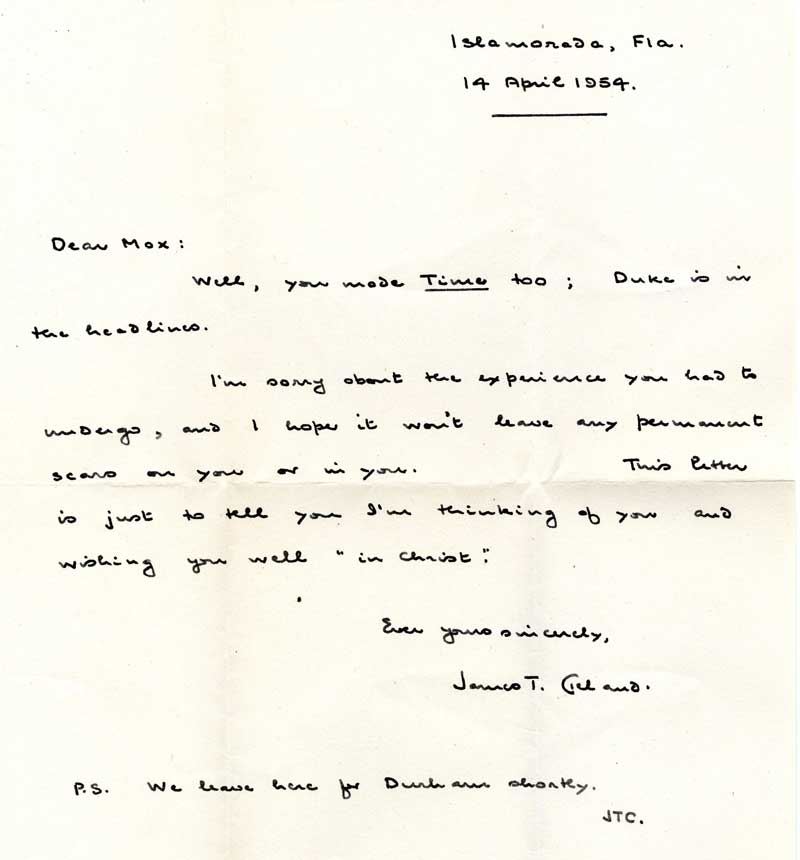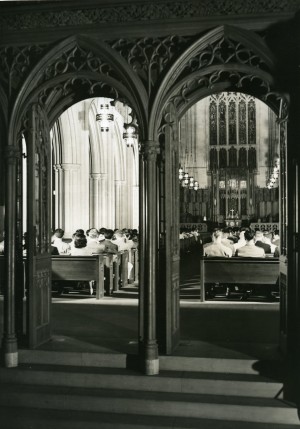Contributed by Erin Ryan, Drill Intern for the Duke University Archives.

The Duke University Archives recently received the Joseph Mitchell Papers on Max Wicker, a collection of letters, news clippings, and other documents that culminate in a 2006 paper, The 1954 Firing of Max Wicker and Two Other North Carolina Student Directors, Jimmy Ray and J.C. Herrin, by Duke alumnus Joseph Mitchell.
Max Wicker, a 1952 Duke Divinity School graduate, was president of Duke’s Baptist Student Union (BSU) in 1953. After graduation, he was hired to work at Duke by Jimmy Ray, secretary of the statewide BSU.
Later that year, Baptist student leaders began planning their annual BSU conference, to be held in November 1953. Ray invited Christian theologian Dr. Nels Ferré, a Congregationalist who taught at Vanderbilt University, to be the conference’s main speaker. But some on the N.C. Baptists’ general board had heard that one of Ferré’s books cast doubt on the doctrine of the virgin birth of Jesus Christ. Ferré’s speech was canceled.

The general board then began an investigation of the programs and leadership in the Baptist Student Union throughout the state—as TIME magazine’s April 12, 1954 issue put it, “digging into charges that the Baptist student pastors have been guiding their young congregations independent of regular church supervision.” By 1954, the board had scheduled a hearing for three student leaders—Ray, 39; Wicker, 29; and J. C. Herrin, 39, the secretary of the UNC-Chapel Hill BSU chapter.

The hearing lasted six hours, ending just after midnight on March 31, 1954. Wicker delivered a three-page statement to the board explaining his faith. (TIME magazine quoted him as saying to the board, “I do not deny the virgin birth, and I do not affirm it. My mind is still open.”) In the end, the board dismissed the three leaders from their jobs with the BSU. According to TIME, students at the meeting dissented, but “most of the 500 Southern Baptists present thought that the board was right, and that the young ministers were too ‘interdenominational’ for comfort.” The results of the hearing appeared in front-page stories in newspapers around the state.

After the BSU dismissed him, Wicker continued at Duke—where he remained employed—for a few months as a chaplain, then resigned and became a Methodist minister.
Joseph Mitchell had met Wicker while they were both at Duke Divinity School. (Mitchell graduated in 1953, and later returned to Duke for his doctorate in religion in the 1960s.) Mitchell was also a Methodist minister. After he and his wife Norma retired, they moved to Durham in 2001. There, they lived near Wicker and his wife Ann, and Mitchell began researching the nearly 50-year-old case of his friend’s dismissal to tell his story.
The Joseph Mitchell Papers on Max Wicker are open for research.
See: “Baptist Dismissals,” in TIME magazine’s “Religion” section, April 12, 1954.




